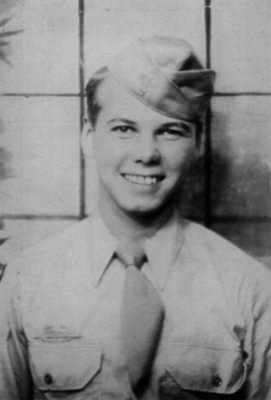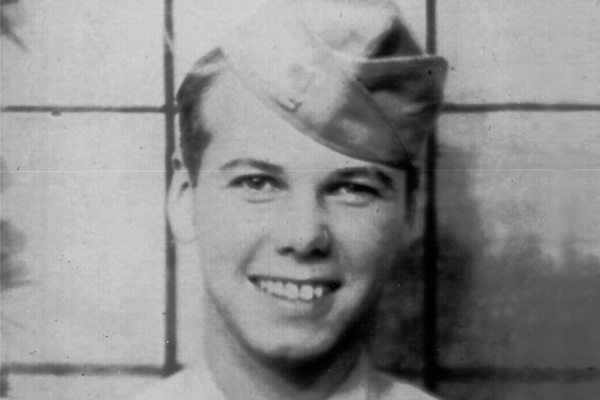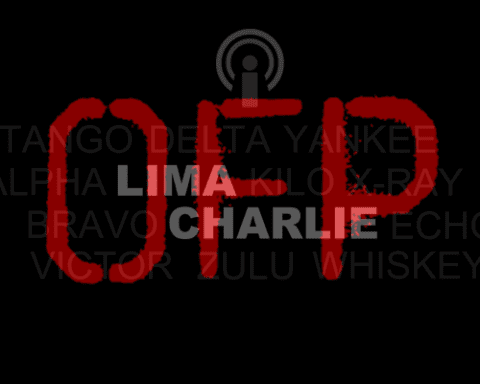Lima Charlie had the honor of interviewing WWII U.S. Army veteran Richard Manchester (Co. K 345 Inf. 87th Division). This is his story.
By Don Johnston and Rob Swain, with Anthony A. LoPresti
My colleagues and I thought we were prepared for our interview with Richard Manchester. No amount of research can prepare a man for what we heard that day.
Richard Manchester is a quiet and soft-spoken man at his age. I’m sure if you had a casual conversation with him, you might never know that he saw one of his brothers eviscerated by an enemy machine gun at the beginning of his combat tour, during the Second World War. One might never know about the time during the Battle of the Bulge – while every other soldier in his company was in a prone fighting position – he was trudging through knee-deep snow, up and down the front lines, in efforts to find platoon leaders, delivering handwritten notes from the Company Commander. His issued “Handy Talky” radio (SRC536), which was supposed to facilitate his mission, was useless in the woods. Combat ineffective.
Then, during his run along the lines, one of the platoon leaders – 2LT Burke – stood up to lead the charge forward and was shot in the head, “right between the eyes” instantly dropping him to the ground; dead as the winter they also had to fight.
Understandably, his morale was low after seeing men with their arms missing and many others wounded, but he and his company pushed on to the Bloody Crossroads where his Captain was wounded. His First Sergeant had ordered him to take the officer back to the aid station. Just when he had wrapped his head around, to carry his wounded brother back to the medics, his First Sergeant said “Forget it…he’s dead”. His team kept moving, hoping to survive.
I agree with Mr. Manchester when he said, “survival is so often by chance.” Whether I was stationed in Panama, Africa or Iraq, as a soldier or civilian, I learned that no matter how experienced a soldier is, when it’s your time to die, it’s just your time. There really is no help in worrying too much about that; you just keep movin’. Some things don’t change.
In most WWII films or television series, it seems the men who are the subject of the stories are depicted as being well trained, equipped, bonded with each other as a team, and as informed as one would think a man headed into combat should be. In Mr. Manchester’s story, he gives a clear picture, from a young enlisted man’s perspective, of what it was like heading into the Army during WWII. Being “ready” was not always the case.
 With the war on, in June 1943, Richard Manchester enlisted as a young 16-year old boy. Soon he was off to basic training at Fort Benning, Georgia. He had the basics of combat training and his advanced training for his MOS before being shipped off to England. This was the beginning of what would be a brutal winter across Europe, and these men showed up for the fight with hardly any preparation for the terrible conditions. They didn’t have the right boots and they really had no idea what to expect. Bewildered, I’m pretty sure nobody had an idea of “plan, plan, plan…execute…AAR”.
With the war on, in June 1943, Richard Manchester enlisted as a young 16-year old boy. Soon he was off to basic training at Fort Benning, Georgia. He had the basics of combat training and his advanced training for his MOS before being shipped off to England. This was the beginning of what would be a brutal winter across Europe, and these men showed up for the fight with hardly any preparation for the terrible conditions. They didn’t have the right boots and they really had no idea what to expect. Bewildered, I’m pretty sure nobody had an idea of “plan, plan, plan…execute…AAR”.
When he had enlisted, Manchester enrolled in the ASTP (Army Specialized Training Program), where he was sent to complete a two year engineering program, and was promised a commission as a 2nd Lieutenant in the Army Corp of Engineers. Many of the cadets from the ASTP had the highest scores on the Army General Classification Test. As the War Department acknowledged “Your intelligence, training, and high qualities of leadership are expected to raise the combat efficiency of (our ground) units”.
With these words possibly still ringing in his ears, on Thanksgiving Day, 1944, Manchester and his unit moved out across the English Channel. I can appreciate that; I’ve spent many holidays in combat zones and one just tends to forget about them; it’s just another day. On that day, Private Manchester climbed down cargo netting to a landing craft, while carefully timing the final drop to match the lulls of the La Havre swells. “Time it wrong and you risked a broken leg, or worse being crushed between the LCI and the channel transport ship”, he recalled. Once safely aboard the LCI, a short trip to the beach, then French soil. From there it was on to Ruen and ten rain filled days in an apple orchard doing close order drills waiting to move out.
The Saar
On December 4th the 345th was herded into 40 x 8 boxcars for what turned out to be a frustrating four day train ride through France. “Some of the men were relieving themselves in their helmets then hanging them from rope above their heads”, he recalls. Finally they arrived in the town of Metz. “The 5th Division had Ft. Driant, the last of several forts around Metz surrounded. But before we could organize a full relief, the Germans in the fort surrendered”. With their mission cancelled, the men of K Company soon discovered a large supply of the potent locally produced Calvados brandy. In the drunken night that followed Richard recalled “One of the sergeants started to reprimand Pvt. Romero, who threw his rifle in the gutter and promptly urinated on it”. This continued until the Calvados was gone and all the men had passed out.
By December 13th the 345th was headed toward the Saar Basin to relieve a regiment of the 26th Division: “It was a cold, barren place with copses of woods concealing enemy machine gun emplacements and tanks, deadly for foot soldiers”. As they passed through the 26th Division’s line the men stared silently as Manchester and his unit walked past. As they cleared a stand of trees along the ridge, the entire hillside erupted in shell bursts. “They didn’t even tell us we were going into action”, Manchester said. “We thought we were headed to an area to bivouac!”
As the shells from the German 88s continued to explode around them, men were knocked down. Some got back up, but many others did not. As the shelling began to taper off he noticed Bob Polk, the supply Sgt., lying a few yards ahead. Sgt. Polk smiled at the private and said “I wish I had an ice cream cone”. With that Richard began to dig the first serious foxhole of his military career.
In 2010 Richard Manchester wrote about this day: “The fist day of combat is not as you imagine it from training films, lectures, and field exercises. You could be killed. Survival is so often by chance. You can dig in, seek cover, hit the ground – but it’s all by chance”. The 345th lost more men in the Saar in 10 days than in over 3 weeks of The Battle of the Bulge.
I can’t help but replay our conversation, when I learned that Richard Manchester’s first day in combat simply emerged unexpectedly as his company was moving from Le Havre near Metz. No brief or preparation, there were only just orders and moving. So, when his unit started to receive IDF everyone seemed surprised they were in-action. In Iraq, even during a basic movement from point A to B, my little four-man team would always talk about what we were doing, any potential threats, and what to do in case things took a turn for the worse. Today, soldiers and marines are put through months, and sometimes years of training before they deploy. Even if they never deploy, their entire existence is to train, train, train.
When I deployed to the Iraq theater in 2003, we didn’t have much either. Our communications were limited; we had long rifles, basic body armor and MREs. Despite us not having much, the Marines we linked-up with in Mosul had even less. Yet all of us were still much more prepared than Mr. Manchester and K Company when they marched into that combat zone. Yet they pushed through, and Richard Manchester would survive almost unscathed to tell his story.
The Bloody Crossroads
On December 23, the 345th climbed onto trucks and left the Saar Basin. Poor sanitation and stress meant diarrhea was rampant through the regiment. After a long, cold, miserable ride, they arrived at the reserve area on Rheims. Manchester’s division, the 87th, found itself the only organized force between the German advance and Paris. Upon their arrival in Rheims, Manchester stated “We had showers, a change of clothing, and were issued worn galoshes”. After only two days they climbed back on trucks for the freezing ride to their next objective, the woods 10 miles west of a town called Bastogne.
Eventually the 345th would encounter the retreating remnants of the 28th Division, which had so few men they had to flee before they were surrounded. As the 28th pulled back, P-47 Thunderbolts dropped bombs close by on the rapidly approaching Germans. With the close air support and the quick deployment of the men, they managed to halt the German advance in their sector. The next several days were relatively inactive for K Company, they even had hot food brought up to the line. Manchester, who had been sent to Division HQ returned only to find the chow line deserted, and moved forward to a house at the top of the hill to find out what happened to his unit. He arrived just in time to see a line of advancing German troops being obliterated by US artillery fire from a second story window. Afterwards, K Company enjoyed their meal in relative comfort and safety.
After that, K Company moved into defensive positions and set up Company headquarters in an occupied house at a fog bound crossroads. The situation was tense since an attack could come from almost any direction and they had lost their only anti-tank gun. But the predicament did provide a rare treat for Manchester and his enlisted comrades. “Officers were given a monthly ration of a bottle of scotch and one of gin. Capt. Dawe received his while we guarded the crossroads. From our sleeping quarters, we had to pass through his office and bedroom. There stood the bottles on the tables”. He continued, “After he enjoyed a party of one, he bedded down, sound asleep. As each man passed though the room, he took a small sip of either scotch or gin. In the morning, Capt. Dawe was slightly amazed he drank that much”.
Unknown to Manchester, the worst of the fighting for K Company was yet to come. Over the next three weeks the fighting to control “The Bloody Crossroads” would extract a heavy price.
The Worst Day
(Author’s Note: The following section is taken in its entirety from Richard Manchester’s personal account of February 6, 1945. Any attempt to edit or abridge this narrative on our part would be a disservice.)
February 6, 1945 would be the worst day of the war for me, K Company and the 3rd Battalion. Our objective was a crossroads important to the defense of the Siegfried Line. We moved out in the morning and began an advance through a cutover section of woods. Without warning, German 88s on our left flank opened up. We had been ambushed. Flat trajectory fire was so close that shells exploded before the report of the ’88’ was heard.
Steck and I dove into a small watercourse. Water trickled through our clothes. Shells were exploding and throwing dirt on us. You are never so alive as when you think you will be dead. I could see with intense clarity the moving water, blades of grass and the dirt sides of the watercourse. I was paralyzed. There had always been a chance to drop, run and find cover, or get away. My life was not in my control. I told God I would do anything for Him if he would save me.
Minutes went by. Then I heard George Covar calling, “Medic, medic.” There were no medics. I didn’t want to do anything but lie in that watercourse. Something had to be done. I crawled out on my stomach. Covar was lying on a slightly elevated foot path. Fire had either slackened or shifted. I lay beside him. A shell fragment had struck below his left knee and exited above his ankle. There was not much bleeding. I put sulfa powder on the wounds and taped on gauze pads. I urged him to get in the watercourse with Steck and me, but he refused. Covar was a small man, but a great chowhound. I remember one morning standing in line behind him, waiting for pancakes. We got three pancakes that morning instead of the usual two. Covar turned to me with glistening eyes and said, “When I think of all the times we only got two!”
Later, I don’t know how long, several of our tanks appeared to drive off the Germans. As they moved up through the clearing, I was afraid the nearest tank might run over Covar. I left the cover of the watercourse and ran to the tank, waving my arms to stop it. The hatch opened and a red-haired sergeant jumped down. We squatted on the lee side and I pointed out where Covar lay. The tank commander, calm and casual assured me they would stay clear of Covar.
Firing ceased and litter parties were making their way to the dead and wounded. Snipers in the woods ahead had taken a toll, as well as the 88s. The litter bearers gave us a stretcher to carry Covar to the aid station. They were too short-handed to carry him. Steck and I soon found carrying a man on a stretcher, even if small, is a four-man job. We passed Otis Hebert. He was in a praying position on his knees, head on the ground but dead. We had to put the stretcher down every 100 feet or so. Our arms couldn’t take the dead weight. We finally reached the battalion aid station tent about a half mile away.
It was now late afternoon. We delivered Covar and were ready to leave. I would have been alright except a sergeant was brought in with his right arm missing. One of the aid men at the entrance said in a cheery voice, “Well, Sergeant, what’s your trouble today?” I went blank. I sat down outside the aid station. Steck left. I sat there all night. No one spoke to me. In the morning I got up and went back to my company.
Eighty men had been brought to the aid station that day.
The Long March Home
After the horrors of that February day, the 345th fought on, through Kobschied, Koblenz across the Rhine into Germany itself. In mid-March after months of misery in the cold and wet, Manchester was finally issued rubber soled shoe-pacs, but too late to be effective. The end was beginning to be in sight. German patrols began to surrender instead of fight; battle hardened troops were replaced by fanatical bands of Hitler Youth. Large groups of prisoners could be seen lounging on the side of the road with a single MP guarding them.
The 87th liberated the Ohrdruf concentration camp. Prisoners not executed by fleeing SS guards were near death from starvation and disease. By late April they were a few miles from the Czech border. Manchester and several of the men from Company K were peeling potatoes when orders came to form up for a patrol to clear any Germans between them and the advancing Russians. “We looked at each other. Who wants to be killed when the war is almost over? We reluctantly shouldered our weapons and set off. Fifty yards down the road, a messenger called us back. It was V-E Day. We went back to peeling potatoes”.
With the war over, Richard Manchester transitioned into a 57-year career in aluminum sales and marketing. His transition alone is an amazing accomplishment. With 22 service member suicides per-day, perhaps we can learn something about readjustment from a man like Mr. Manchester.
Today he lives in South Carolina where he retired, and is considering writing a book not about his experiences in World War II, but his time in New York working in the aluminum industry. We here at Lima Charlie will be waiting to snatch up the first copy.
Don Johnston and Rob Swain, with Anthony A. LoPresti, Lima Charlie News
Lima Charlie provides global news, featuring insight & analysis by military veterans and intelligence professionals Worldwide.



![Image World Press Freedom Day has us asking ‘What is the state of free press in democracies worldwide, and why has America’s free press ranking dropped?' [Lima Charlie News]](https://limacharlienews.com/wp-content/uploads/2019/05/World-Press-Freedom-Day-01-480x384.png)
![Image GailForce to Space Force: 'Make it so' - the Space Force debate continues [Lima Charlie News]](https://limacharlienews.com/wp-content/uploads/2019/05/Space-Force-01-480x384.png)
![Image Memorial Day may soon be a remembrance of democracy and those who had the courage to defend it [Lima Charlie News]](https://limacharlienews.com/wp-content/uploads/2018/05/Memorial-Day-may-soon-be-a-remembrance-of-democracy-and-those-who-had-the-courage-to-defend-it-Lima-Charlie-News-480x384.png)
![A Trump war crime pardon dishonors us all [Lima Charlie News]](https://limacharlienews.com/wp-content/uploads/2019/05/A-Trump-war-crime-pardon-dishonors-us-all-Lima-Charlie-News-480x384.png)

](https://limacharlienews.com/wp-content/uploads/2019/03/Remembering-Becket-A-mothers-search-for-answers-480x384.png)


![Image World Press Freedom Day has us asking ‘What is the state of free press in democracies worldwide, and why has America’s free press ranking dropped?' [Lima Charlie News]](https://limacharlienews.com/wp-content/uploads/2019/05/World-Press-Freedom-Day-01-150x100.png)